What It Was Like To Eat At The First Hamburger Restaurant In The US
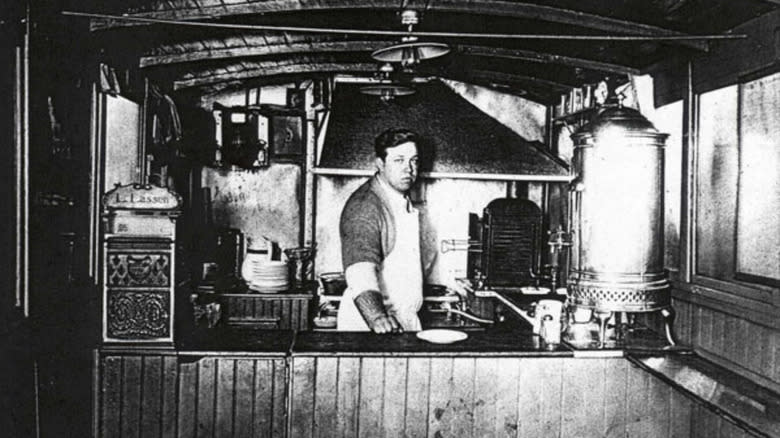
You will have a hard time finding a more iconic American food than the hamburger. A grilled meat patty in the bun has become a symbol of the US. But where does this mouthwatering dish originate from? The story of this American classic starts in Connecticut, as noted by the Library of Congress, where Danish immigrant Louis Lassen created the burger in 1900 in his restaurant called Louis' Lunch. The rest is history. Burgers quickly started appearing on the menus of fast food joints, restaurants, and street carts conquering the US and the world with their simplicity and sizzling deliciousness.
And you can still have a taste of the very first burger today. Founded by Lassen in 1895, Louis' Lunch has been in continuous operation for more than 100 years serving its iconic beefy menu item in strict accordance with the original recipe. This includes the ground beef patty, white bread toast, tomatoes, and onions. There are no condiments though, as it's a well-known Louis Lunch prohibition. The restaurant still operates from a historic brick house where it moved in 1907. Let's take a closer look at how one of America's greatest old-school restaurants came to be.
Read more: The Ultimate Ranking Of American Fast Food Restaurants
The Hamburger Was Created In A Rush In 1900
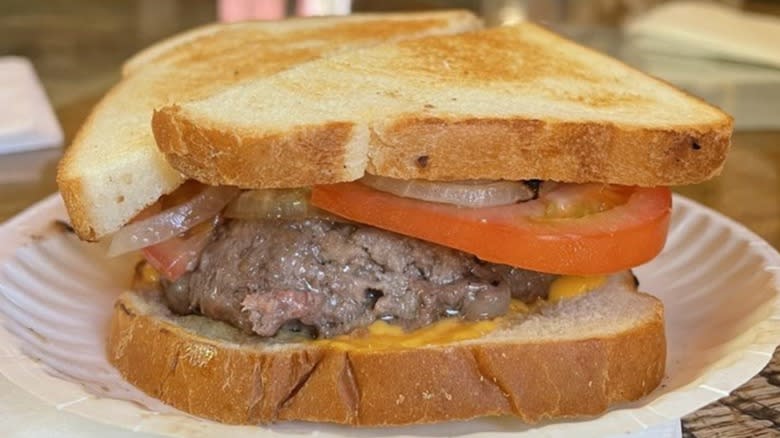
Food origin stories, especially the ones that are more than 100 years old, usually have a delightful quirk to them. Louis' Lunch claims to have invented the hamburger and many back its claim. The legend has it that in 1900, a customer came to Louis Lassen to order a takeaway. Back then, Louis' Lunch operated a food cart and sold steaks in Downtown New Haven, Connecticut. The man was in a hurry and begged Lassen to prepare something suitable for consumption on the go and do it quickly. That hurried customer became a reason why hamburgers exist.
The story goes that Lassen decided to unknowingly change the course of food history by putting the grilled patty of freshly ground meat inside the toasted bread. And there it happened; the most recognized American dish was born. Serving the grilled meat on toast was what made the hamburger revolutionary at the time. The dish was perfect for a takeaway meal, but was also filling and extremely delicious. The dish was an affordable affair too as the burger cost only 7 cents in 1900.
The Restaurant Has Been In The Same Building Since 1907
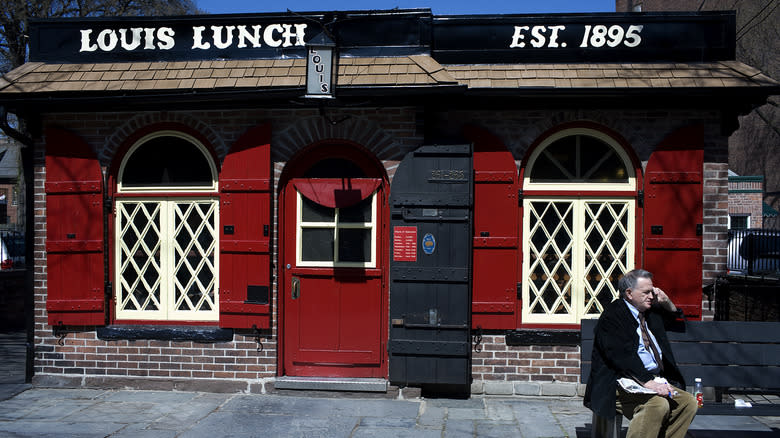
Seven years passed until Louis Lassen finally decided to leave the food wagon behind and move into a building to operate a full-scale restaurant. In 1907, Louis' Lunch opened its doors in a new incarnation inside the red-brick house on George Street. It became an official landmark of New Haven in 1967. The tiny edifice only featured 20 seats. It had red shutter windows, dimmed lighting, and sported dark wooden tables with school-like benches.
Curiously, you can still have a burger in the same building, but not at the same spot. In 1975, the whole house was moved to 261 Crown Street as a way to dodge the threat of eviction. So you're kind of stepping into the original 1907 dining ambiance but in a new location. Louis' Lunch is still a minuscule place where finding a table can be a challenging task. You may also notice many etchings with patron's names on the wooden tables. This is a long-running local tradition that continues to this day.
Broilers Were Key To Making Louis' Lunch Burgers
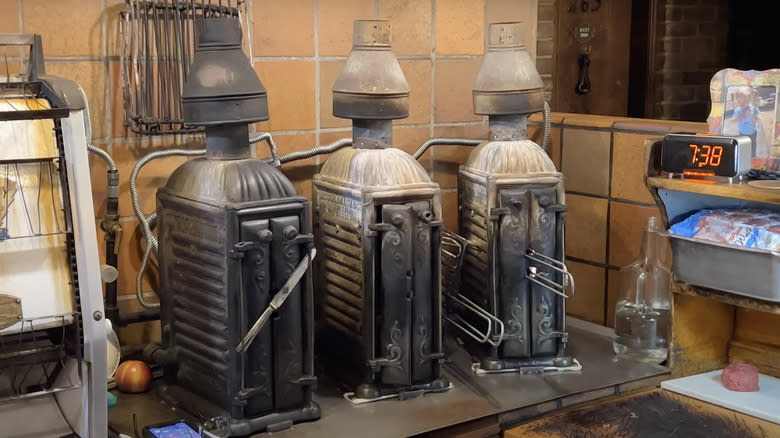
New Haven is a stronghold of traditions and Louis' Lunch is among its most iconic culinary institutions that has century-old customs of its own. While many burger restaurants around the US use modern grills, you won't find any signs of modernity in Louis' Lunch's cooking methods. On the contrary, the place is proud to grill patties exactly like the founder did -- that is, by using the vertical cast-iron broilers that are as old as the restaurant itself. Now this is devotion to tradition. And it's not only the meat that goes in the broiler, the onions get the old-school grill treatment too, adding to deliciousness that is Louis' burgers.
But why does the restaurant still use kitchen tech that was made in 1898? Not only is Louis' Lunch a purist establishment true to its origins, but the vertical broilers allow the meat to be grilled evenly and prevent it from getting too greasy. The excess fat just drips away leaving a perfectly prepared patty. By default, the restaurant gives you the burger medium-rare, but you can always ask for a different level of doneness.
The Restaurant Uses Toast Instead Of Buns
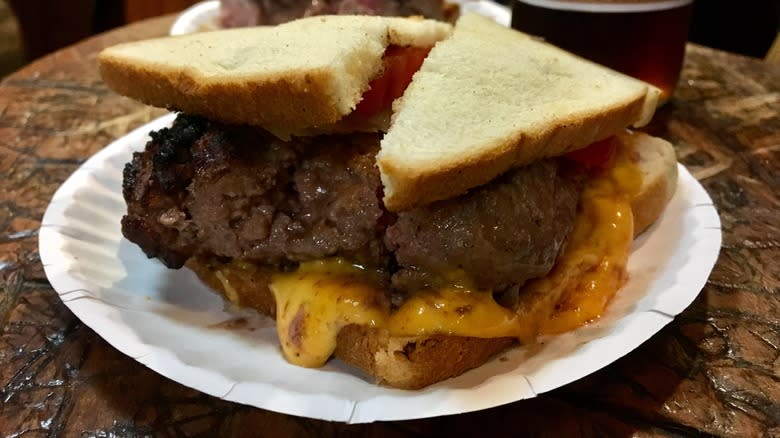
Wait, so the first hamburger in the US didn't actually look like a traditional burger with a bun? Well, that's the trademark of Louis' Lunch. The venue has been using toasted white bread for preparing its killer dish since its inception. And as with broilers, the place uses some antique stuff to make everything traditional. The machine is the Savory Appliance Radiant Gas Toaster and it dates back to 1929. Everything stays very local too. The slices come from Pepperidge Farm, a brand founded in 1937 just down the road in Fairfield.
Choosing toasts over buns has been quite a controversial matter for Louis' Lunch putting its title as the burger originator under attack. Some food researchers like Josh Ozersky questioned its right to claim credit for the dish invention because the classic hamburger in a bun came a bit later. It's believed that the latter was invented by Walter Anderson circa 1915 in Wichita, Kansas. The patty in the identical buns became a staple of Anderson's White Castle fast-food empire. What White Castle doesn't have, though, is recognition from the Library of Congress. Lassen's Louis' Lunch still wins this hamburger battle with or without the bun.
No Condiments Are Allowed In Louis' Lunch
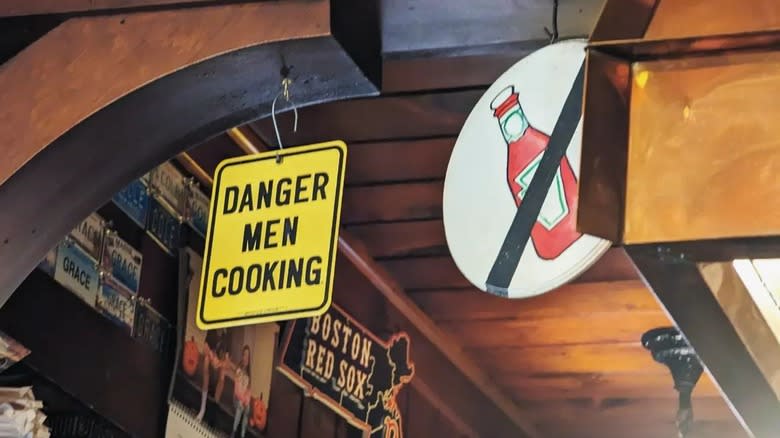
Are you a ketchup or mayo person? That doesn't really matter here. Either way, you won't be allowed to add condiments to your burger. Louis' Lunch is one of the hamburger places that strictly prohibits ketchup. There's even a poignant sign inside with the crossed-out ketchup bottle. It's no joke, the institution is serious about the policy. "My great-grandfather, my grandfather, and my father were very strict about the no-condiments," explained Jeff Lassen, the fourth-generation owner of Louis' Lunch in an interview with AOL, adding, "That's the way it's going to be and that's the way it's going to stay."
But it's not the hate for the ketchup that drives this policy. The restaurant takes great pride in its traditions. One of those is preparing fresh ground meat daily in the morning and putting it through the grilling process in the vintage vertical broilers. All four generations of owners believed that the condiments don't add anything to the taste of the meat and you will have the best experience without ketchup or mayonnaise. Considering that Louis' Lunch has been successfully in business for more than 100 years, you have to respect this point. You simply don't mess with an institution that has a sign saying "This is not Burger King. You don't get it your way. You get it my way, or you don't get the damn thing."
You Won't Find Fries Here Either
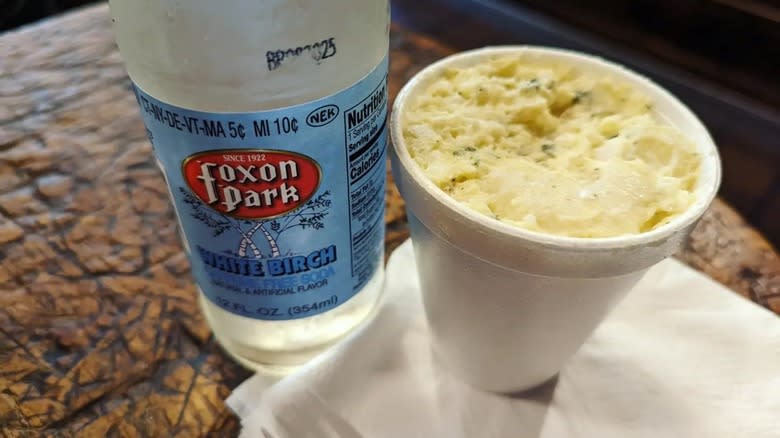
The whole world is used to the fact that burgers are served with fries on the side. But you won't find any at the OG of American hamburgers in Downtown New Haven. We shouldn't forget that Louis' Lunch is not yet another commercialized fast-food joint, it's New England's national landmark. That's why its menu choices are honoring the history, and the history never included fries at this small brick temple of the burger.
The much-loathed ketchup is the reason why. In an interview with Mashed, Jeff Lassen said, "French fries require ketchup. If you put it on fries, [it's] going to lead to being on burgers." And, remember, condiments are strictly prohibited at Louis' Lunch, so no luck dipping your golden fries on the side while devouring the burger here. Potato lovers aren't completely ignored, though. Connecticut-produced Deep River potato chips are on the menu so you will have something to munch on while waiting for your patty. Another side is a potato salad served in a plastic cup.
The Menu Hasn't Changed Much Since 1900
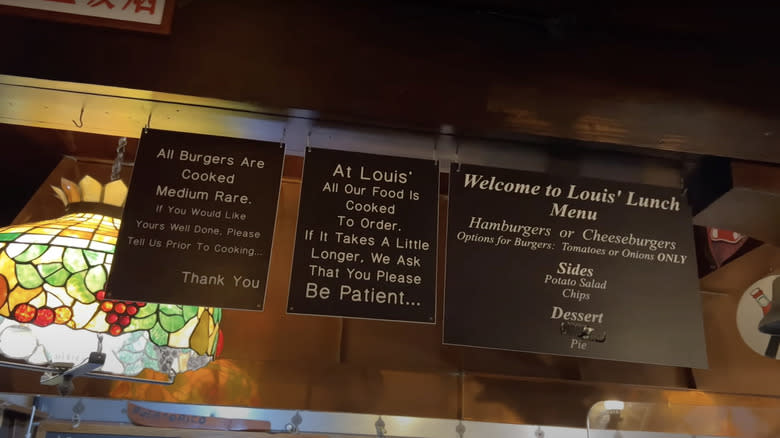
Food trends might come and go, fast food chains might expand to reach more global markets, and hamburgers might get new varieties, but none of it affects Louis' Lunch. The establishment's menu is a testament to being faithful to old ways. Probably, it's also the reason why the place is frequently mentioned among the best burgers in America.
The burger remains the restaurant's main item, but since the 1950s a cheeseburger (called "cheese works" in local lingo) option has also been available. Tomatoes and onions remain the only kind of add-ons you can have, and that hasn't changed since 1900. The cheeseburger comes at the same $8 price as the ordinary burger. As for the drinks, one of the favorites is the Foxon Park root beer, yet another Connecticut brand.
If you're still hungry for something sweet after the delicious sizzling burger, order one of the homemade pies. The dessert was added to the menu in the 1960s by the current owner's mother Leona Lassen, and the flavors change regularly.
The Restaurant Is A Media Darling And A Celebrity Hotspot
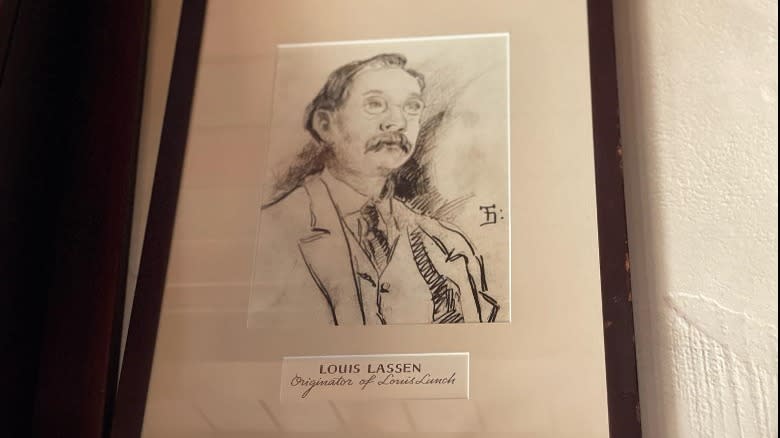
Media attention is imminent when you've been open continuously for more than a century and invented the burger. Louis' Lunch didn't have a problem with the marketing throughout its long history, with Oprah, History Channel, Travel Channel, and Food Network all having filmed there. The reality television series "Burger Land" even aired episode about the institution.
All of this indicates that apart from creating the burger, the founder Louis Lassen was a talented marketer. His descendants carried the business through the trials and tribulations of the 20th century cementing the "US-first burger" brand.
Apparently, some of the US presidents couldn't resist the mouthwatering taste of Lassen's creation either. Steven Raichlen's 2003 book "BBQ USA" mentions George H. W. Bush and George W. Bush among Louis' Lunch fans. Steven Spielberg and Laurence Fishbourne have also been known to stop by for a burger.
Louis' Lunch Plays A Large Role In 'Hamburger Folklore'
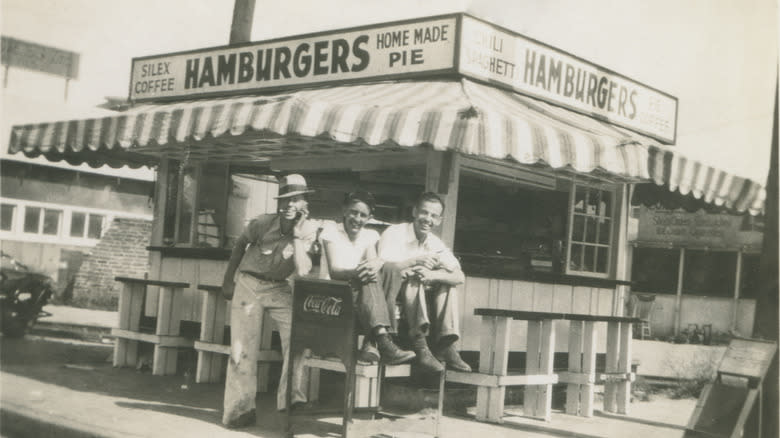
Louis Lassen and his family have fiercely defended the story of creating a burger in a rush in 1900, but researchers point out that the Danish immigrant was far from the first to put the patty in a bun. In fact, the burger's roots go as deep as 1st-century A.D. when a cookbook written by Apicius included a recipe for a minced meat patty. There's also Rundstück Warm, which is basically grilled meat on bread that originated in the 17th century in Germany.
As for the US, Connecticut is only one of many states claiming to have the original burger. Ads for the so-called "hamburger steaks" served with bread have been found in New York, San Francisco, Reno, and Boston newspapers from the 1880s. In Wisconsin, it's believed that in 1885, Charlie Nagreen created and sold the dish at a fair. Texans beg to differ, arguing that the hamburger's father is actually Fletcher Davis, who introduced the recipe in the 1880s. The chase for proudly claiming to be the first to invent the hamburger even has a name. It's called "hamburger fakelore" and the phenomenon is intricately connected to Americana.
But Louis' Lunch's title of hamburger cradle is safe and sound for now. The restaurant is the only one recognized by the Library of Congress. Thus, the Louis Lassen-founded business continues to reign supreme in the hamburger origin story lore.
Static Media owns and operates Daily Meal and Mashed.
Read the original article on Daily Meal

 Yahoo Lifestyle
Yahoo Lifestyle 
